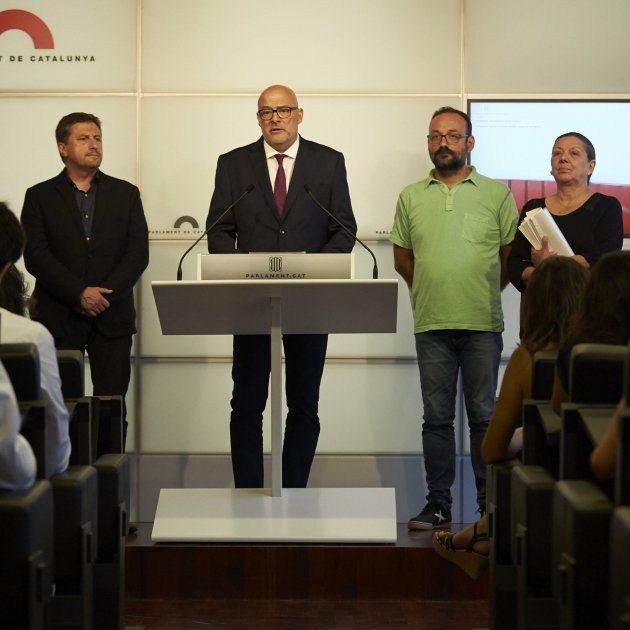There are 33 days before the referendum, and the roadmap is entering its last stages, regardless of the warnings from the Spanish state. The latest movement by the pro-independence groups has been the presentation this Monday of the Law of Transitional Jurisprudence and Foundation of the Republic, the text conceived as the “supreme rule of the Catalan legal system” until the new Republic can approve its Constitution.
Mid-morning the JxSí (Together for Yes) and the CUP (Popular Unity Candidacy) publicly presented the bill, almost by surprise, after keeping it under lock and key. As with practically all the details of the roadmap, the moment of its presentation also resulted in an intense debate.
Immediately, the opposition groups made their appraisals from the lectern of the press room, whilst the independence deputies were still explaining the text - of 89 articles and three additional dispositions- to the journalists in one of the rooms of the Chamber.
Early in the afternoon, tranquility had returned to the corridors of Parliament, which now regularly experiences these seismic points of intense information. The independence deputies processed the registration of the bill at 2pm, whilst the Catalan Chamber, still on the summer schedule, was preparing to close its doors, leaving the workers there to take advantage of cleaning the corridors and passageways.
Call Sánchez-Rajoy
However, the effect of the presentation of the bill in the Catalan Parliament resounded with force in the Spanish capital. The general secretary of the PSOE (Spanish Socialist Workers' Party), Pedro Sánchez, even felt the need to phone the Spanish prime minister, Mariano Rajoy, to guarantee that he will be at his side when considering a joint position “in defense of legality”.
At the moment, however, it is unknown what the basis of the response from the state to stop the referendum will be, even though the media in Madrid insist on speculating it will be with the application of the Law of National Security, of the application of article 155 of the Constitution or even the declaration of a state of exception in Catalonia.
In fact, only yesterday, the leader of the Catalan PP (Popular Party), Xavier Garcia Albiol, did not rule out the intervention of the Catalan government through article 155, whilst the socialist Miquel Iceta spoke of a "new deceit", and the leader of the opposition, Inés Arrimadas, claimed the presentation of the project was an attempt to cover up the demonstration of Saturday in Barcelona where King Felipe VI was whistled at.
Orderly disconnection
The Law of Transitional Jurisprudence presented yesterday by JxSí and the CUP is one of the key laws to ensure an orderly disconnection from the Spanish state. It specifies details from the nationality of the citizens of the new Catalan state, to the commitment and continuity of the work and salaries of civil servants - including those administrations of the state - and to the organisation of the institutional framework.
Everything temporarily, however, in a transitory way, as is indicated in the title of the law, given that if 'yes' wins on 1st October, a process will be opened for the election of a constituent Assembly that will be responsible for drafting the text of the new Constitution, which will have to be ratified in a referendum after convoking new elections.
In the same way, as indicated by the third additional disposition, the law will be effective on the condition that 'yes' wins the referendum. If 'no' wins, then autonomous elections will be called and this law will not have any purpose.
Before 1st Oct
Despite everything, the president of the JxSí group, Lluís Corominas, and the deputy of the CUP, Benet Salellas, wanted to make it clear on announcing the presentation of the bill, that the text will be approved before the celebration of the referendum, so that the voters for 'yes' and the voters for 'no' will know “the consequences” of their vote.
Nor did Salellas hide the hope that this law will spur on the citizens, both those for and against independence, to go out and vote on 1st October.
The approval of the law before or after the referendum was one of the pending debates between the independence groups. Now what's missing is to know when it might be approved. In fact, an unknown factor is also when the Law of the Referendum will be approved - it is registered in the Parliament but the Board has not yet admitted it formally for processing, and thus the Constitutional Court (TC) cannot act against it yet - since some voices from the PDeCAT (Catalan European Democratic Party) ask for it to be approved by the government in the form of a decree-law, even though this possibility does not raise much enthusiasm in the executive.
Decisive week
Everything points to the fact that next week will be decisive. The plenary session that starts on Wednesday could approve the Law of the Referendum.
Although the TC appealed against the reform of the Regulations, that allow the approval of propositions of law by an urgent route and one single reading, the groups have other ways to approve the text without following the usual procedures.
From the first moment, article 81.3 of the Regulations allows for the agenda to be altered, at the request of two groups or a fifth of the deputies. This same article opens the door to incorporate issues that “have not complied with the statutory formalities” established by the Chamber, if the absolute majority of the floor so demands.
In this way, the pro-independence groups could quickly overcome the obstacles that may be posed by the opposition to approve the Referendum Law and, once published, the government could sign the call for ballot boxes immediately. This Monday, the pieces on the board have advanced towards some very significant squares.
